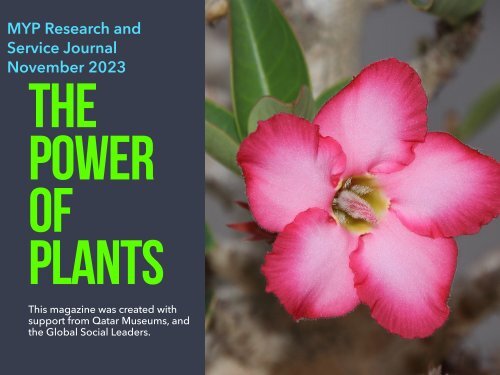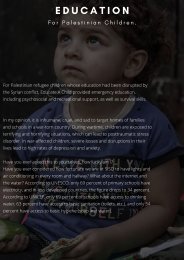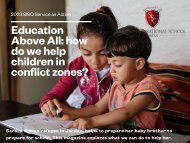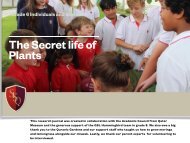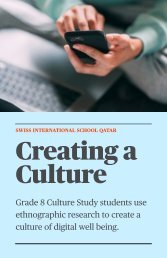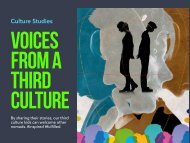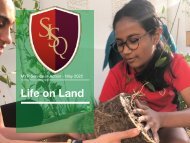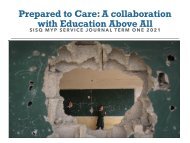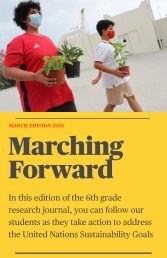The power of plants
At Swiss International School Qatar, plants have the power to heal, feed, inspire and unite different cultures and perspectives. This edition focuses on how the garden empowers learners of all age to celebrate their hidden histories and take action to reach the United Nations Sustainable Development Goals. ERRATA: One of the articles refers to the Republic of the Sudan as South Sudan
At Swiss International School Qatar, plants have the power to heal, feed, inspire and unite different cultures and perspectives. This edition focuses on how the garden empowers learners of all age to celebrate their hidden histories and take action to reach the United Nations Sustainable Development Goals. ERRATA: One of the articles refers to the Republic of the Sudan as South Sudan
- No tags were found...
Create successful ePaper yourself
Turn your PDF publications into a flip-book with our unique Google optimized e-Paper software.
MYP Research and<br />
Service Journal<br />
November 2023<br />
THE<br />
POWER<br />
OF<br />
PLANTS<br />
This magazine was created with<br />
support from Qatar Museums, and<br />
the Global Social Leaders.
<strong>The</strong> Desert rose<br />
<strong>The</strong> National Museum <strong>of</strong> Qatar was designed by Jean<br />
Nouvel to represent a desert rose. <br />
In the middle <strong>of</strong> a desert, another desert rose leaves bright<br />
splashes <strong>of</strong> colour to celebrate the <strong>power</strong> <strong>of</strong> Nature to burst<br />
forth in even the harshest conditions.<br />
In heat and humidity that approaches 50C, our desert roses<br />
bloom defiantly. Our frankincense has doubled in size. Our<br />
Sidra trees have poked us full <strong>of</strong> holes because they grew<br />
taller than their support poles.<br />
And we are ready to collapse after just 5 minutes <strong>of</strong><br />
standing outside.<br />
Plants are truly <strong>power</strong>ful. <strong>The</strong>y feed us. <strong>The</strong>y give us shade.<br />
We wear cotton and linen. We drink tea and c<strong>of</strong>fee. We<br />
breathe their oxygen. We treat our illnesses with their leaves<br />
and seeds. We brush our teeth with miswak .<br />
But a treasure is worthless if you cannot open it. We<br />
thank Qatar Museums for giving us access to the<br />
treasure <strong>of</strong> knowledge. A treasure we get to share!
<strong>The</strong>se are the gifts we get<br />
from<br />
Plants<br />
Oxygen <br />
Clothing<br />
Building<br />
materials<br />
Paper<br />
Medicine<br />
Cosmetics<br />
BUT LET’S NOT<br />
FORGET THAT<br />
WE NEED TO<br />
GIVE<br />
SOMETHING<br />
BACK TOO.
After Cop21<br />
Thanks to a brilliant initiative from Mr Peter Milne from<br />
Target4Green Education and Mr Chris Bailey from <strong>The</strong><br />
International School <strong>of</strong> London, our students were able to<br />
attend a symposium on climate change.<br />
Not only did we get to hear from other young people and<br />
climate experts, we also got to share about how we were<br />
using our MYP IDUs and Culture Studies classes to fight<br />
climate change. <br />
As you can see, many schools were very interested in<br />
starting their own gardens and we are looking forward<br />
to supporting wherever we can.<br />
Our students were asked to reflect deeply on how our<br />
every day actions threaten the wellbeing <strong>of</strong> Qatar. Our<br />
host nation is highly threatened by climate change but<br />
the average person wastes 250kg <strong>of</strong> food! Reducing<br />
food waste can reduce climate change by 20%.<br />
Let’s see if our young leaders can effectively introduce<br />
composting into our school lunch routines.
Grade 9 GSL Hummingbird Haven creates action plans for developing our green learning areas<br />
Meanwhile, the grade 9s were actively planning how we<br />
could expand the green learning spaces in our school.<br />
<strong>The</strong> little biodiversity garden has now expanded to a plant<br />
hospital and an outdoor green classroom where classes<br />
can collaborate and learn together. It also allows us to<br />
collaborate more closely with our youngest and most<br />
enthusiastic gardeners.<br />
That’s right - let’s welcome Pre K.
Pre-K Power<br />
Are your geraniums sun burned? Have spider mites<br />
attacked your lemon trees? Maybe your spider <strong>plants</strong><br />
need repotting…<br />
Pre-K is here to help!<br />
Even though the Global Social Leaders only starts at 11<br />
years old, the judges were so impressed by how skilfully<br />
<strong>The</strong>o and Poppy worked in the garden that they awarded<br />
them with their own GSL certificates<br />
Over 10500 young people from 100 countries are involved<br />
in GSL and these children are <strong>of</strong>ficially the youngest<br />
leaders to receive a certificate.<br />
This month, <strong>The</strong>o and the falcon class will be creating<br />
bird houses, worm farms and planting tasty vegetables<br />
with their own compost. <strong>The</strong> grade 7 culture studies<br />
students are ready to support with guidance from our<br />
fantastic cleaning staff.
<strong>The</strong> <strong>power</strong> to unite<br />
When our garden was attacked by a vicious combination<br />
<strong>of</strong> hail, high winds and spider mites, our grade 6 and 7<br />
students rushed into action and not a single plant was<br />
lost.<br />
Students from every religion, ethnicity and gender worked<br />
side by side to protect our precious <strong>plants</strong> and we did not<br />
use any poisons.<br />
Students also saved the pre K garden and the <strong>plants</strong><br />
grown by the cleaning staff and this shows us that the<br />
planet belongs to everyone.<br />
At SISQ, we are inspired, fulfilled and prepared to be<br />
Global citizens. It therefore brings me great pleasure<br />
to introduce the research component <strong>of</strong> this journal<br />
where our young people advocate for how we can use<br />
gardening to make a difference.<br />
World hunger is an enormous issue and many <strong>of</strong> our<br />
articles focus on food security and the relationship<br />
between <strong>plants</strong> and conflict.
<strong>The</strong> importance <strong>of</strong><br />
South Sudan by Sammy.<br />
On the 15th <strong>of</strong> April, 2023, the third week <strong>of</strong> Ramadan, (which is<br />
the religious month for Muslims) the Rapid Support Forces, led by<br />
Mohammed Hamdan Dagalo, (also known as Hemedti) began<br />
attacks on the Sudanese Armed Forces. Fighting began in the<br />
Darfur region <strong>of</strong> Sudan at 7:00 am, and Hemedti's forces seemed<br />
to be winning. However, a soldier in the Janjaweed confirmed that<br />
they were indeed being attacked by the RSF, and the message<br />
arrived to the seat <strong>of</strong> the President <strong>of</strong> Sudan, Abdel Fattah Burhan,<br />
the leader <strong>of</strong> the SAF. This forced Hemedti to begin the next<br />
phase <strong>of</strong> his plan early, and at 7 hours and 43 minutes, fighting<br />
between the RSF and the SAF began at the Khartoum<br />
International Airport, at Khartoum, the capital <strong>of</strong> Sudan.<br />
But why does this matter? At the time <strong>of</strong> writing, around 80%<br />
<strong>of</strong> the hospitals in Sudan are destroyed, and only 7% are fully<br />
functioning. Because <strong>of</strong> this, the overall situation <strong>of</strong> living in<br />
Sudan has decreased to much lower than it initially was.<br />
Looting is constant, and the entire country is feeling the<br />
backlash. <strong>The</strong> greater Khartoum area is being hit the worst,<br />
with 96% <strong>of</strong> the area's hospitals destroyed, and only 1% fully<br />
operational. A civilian who used to live near a hospital and<br />
escaped to Egypt said this:
"Only [2] days after the fighting began, the hospital was<br />
destroyed. As I watched, explosions lit up in the<br />
hospital. <strong>The</strong> building caught on fire, and several<br />
doctors and nurses ran from the flames. Before long,<br />
several rockets hit the side <strong>of</strong> the hospital and sent<br />
shudders through the entire building. I couldn't do<br />
anything as the building collapsed. <strong>The</strong> RSF labeled the<br />
destruction [<strong>of</strong> the hospital] as collateral damage."<br />
Many people have risked taking the chance <strong>of</strong> death to<br />
search through destroyed hospitals like this to find much<br />
needed remedies for diseases or other important healing<br />
items. This looting <strong>of</strong>ten leads to fistfights and general<br />
aggression. Due to this, it has become harder than ever to<br />
heal sicknesses and deal with broken bones. <strong>The</strong> UN has<br />
done nothing to stop this, and the only help they <strong>of</strong>fered<br />
was small aid-packs containing bandages, alcohol(for<br />
sterilizing), food, and other small objects. However, the<br />
food <strong>of</strong>ten required heating like tinned goods. This is no<br />
use to the people as they have lost electricity and it is<br />
dangerous to even step outside, and a fire inside a house is<br />
a recipe for disaster. Most <strong>of</strong> the aid-packs do not contain<br />
important healing objects like splints, slings, and other<br />
things you would need to heal a friend in wartime. <br />
Refugee Crisis<br />
In the neighboring countries, such as Egypt, Ethiopia,<br />
Eritrea, Libya, Central African Republic, there is a huge<br />
wave <strong>of</strong> refugees. <strong>The</strong> WHO has stated:<br />
"This is a crisis that could not have happened in a worse<br />
time. <strong>The</strong> time <strong>of</strong> hunger in Chad has come, and there are<br />
even more mouths to feed than before. Chad and Egypt<br />
have the most refugees, and the former is a bad place to be<br />
at this time <strong>of</strong> the year. Crops burn, and people suffer. <strong>The</strong><br />
crisis has to be stopped at all costs. We have made a<br />
$445,000,000 plan to evacuate as many refugees from<br />
Chad and Sudan as possible." <br />
This plan is going to include housing in Europe and Asia,<br />
evacuations from major refugee points in Egypt and Chad,<br />
and temporary refugee camps in Saudi Arabia and other<br />
countries. Sudan already hosts 1,400,000 refugees. Also,<br />
3,700,000 people are already homeless However, the UN's<br />
main objective is to get diplomats and other expats in<br />
Sudan (who have somewhere else to go to) away. <strong>The</strong><br />
Sudanese who have nowhere else to go to are still<br />
suffering in Sudan with no running water, no electricity, and<br />
minimal food.
<strong>The</strong> UN has sent about 73 aid-convoys to Khartoum and<br />
another 33 aid-convoys to the Darfur region. However,<br />
these aid-convoys <strong>of</strong>ten have the supplies like food, water,<br />
bandages and sterilizers, house med-kits and AEDs, and<br />
other objects that they would send to a place that was<br />
suffering <strong>of</strong> an absence <strong>of</strong> hospitals, but nothing that<br />
would help during a war. <strong>The</strong> Sudanese that suffer so<br />
much are not even getting the proper treatments! What's<br />
more, an absence <strong>of</strong> security has left much <strong>of</strong> these<br />
convoys raided before reaching the intended targets, and<br />
the UN still hasn't raised security. <strong>The</strong> UN chief said in an<br />
interview<br />
"Sudan is in a terrible state. <strong>The</strong> Sudanese suffer daily. <strong>The</strong><br />
people <strong>of</strong> Sudan are continually forced to leave their<br />
homes and the country they grow up in to avoid the death<br />
that hangs over their heads. Many are injured, and many<br />
die. <strong>The</strong> Sudanese have been forced to take barbaric<br />
practices <strong>of</strong> thievery and murder to survive. <strong>The</strong> UN will do<br />
all it can to make sure that the civilians <strong>of</strong> Sudan survive."<br />
<strong>The</strong> best thing they could do would be to send a<br />
peacekeeper operation to Sudan, which they haven't even<br />
considered, or raise security on the UN aid-convoys.
<strong>The</strong> focus <strong>of</strong> the world is elsewhere<br />
When I started this project <strong>of</strong> seeing if the UN was actually<br />
doing enough, I came up with the idea <strong>of</strong> testing the<br />
media.Most people get their information from the media,<br />
and children are no different. I came up with a survey to<br />
compare the war in Ukraine to the war in Sudan. <strong>The</strong> UN<br />
has a major part in the media, so I decided to ask my class<br />
mates about the war in Sudan and the war in Ukraine.<br />
As you can see, more than double the people that know<br />
about the war in Sudan know about the war in Ukraine. <strong>The</strong><br />
same goes for the people that know why the war started. <br />
I am a citizen and a native <strong>of</strong> Sudan, and the war started<br />
a week before I was supposed to go there for Eid<br />
vacation. My grandfather was one <strong>of</strong> the first spinal<br />
surgeons in Sudan. I am a whole-hearted Sudanese<br />
(except for the American side <strong>of</strong> my family) and it holds<br />
a special place in my heart. So, when the war started, I<br />
was completely shocked. I needed someone to talk to,<br />
and my classmates supplied that someone. So, the<br />
entire supply <strong>of</strong> knowledge that the class has <strong>of</strong> the war<br />
is mostly coming from me. So I decided to do another<br />
survey with the same questions. I asked 100 people. Sadly, I<br />
got the same results.
Working on our garden - <strong>plants</strong> have <strong>power</strong> to unite different nations<br />
Hopefully, after reading this article, more <strong>of</strong> us will be<br />
able to support young people like Sammy. <br />
His research highlights how important it is to make<br />
sure that all stories get told because all citizens <strong>of</strong> all<br />
countries matter. <br />
This is why November is Hidden Histories month at<br />
SISQ.<br />
This is the time for students to celebrate and promote<br />
issues relating to their own cultures that might have<br />
been silenced by more dominant narratives.
“United Nations in Sudan.” <strong>The</strong> United Nations in Sudan, 2023, sudan.un.org/en. Accessed 27 Aug. 2023.<br />
Zeinab Mohammed Salih, and Ruth Michaelson. “Khartoum Hospitals Being Hit as Sudan Fighting Intensifies.” <strong>The</strong> Guardian, <strong>The</strong><br />
Guardian, 2 May 2023, www.theguardian.com/world/2023/may/02/khartoum-hospitals-being-hit-as-sudan-fighting-intensifies.<br />
Accessed 10 Sept. 2023.<br />
Al Arabiya English. “Air Raids Kill at Least 40 in Sudan’s Khartoum: Group.” Al Arabiya English, Al Arabiya English, 10 Sept. 2023,<br />
english.alarabiya.net/News/middle-east/2023/09/10/At-least-40-killed-in-airstrike-on-southern-Khartoum-market-Localvolunteers.<br />
Accessed 10 Sept. 2023.<br />
<br />
Jazeera, Al. “Sudan’s Army Chief Al-Burhan Meets Qatar’s Sheikh Tamim in Diplomatic Push.” Aljazeera.com, Al Jazeera, 7 Sept.<br />
2023, www.aljazeera.com/news/2023/9/7/sudans-army-chief-meets-qatars-sheikh-tamim-in-diplomatic-push. Accessed 10 Sept.<br />
2023.
Aquaponics<br />
Economics by Raed<br />
Every year, nearly 800 billion fish die. This is a problem<br />
because humans need fish for several reasons. What if I<br />
told you aquaponics, a method <strong>of</strong> farming that will improve<br />
<strong>plants</strong> growth and at the same time we will save the fish. It's<br />
a win-win scenario!<br />
Aquaponics is a method <strong>of</strong> farming that just needs water,<br />
<strong>plants</strong> and fish.In aquaponics we use something called the<br />
nitrogen cycle. First the fish will naturally dispose their<br />
food which makes the water dirty . This leads to ammonia<br />
which is very poisonous to the fish then the nitrosomonas<br />
turn it into nitrite which is even more poisonous than<br />
ammonia, but thankfully the nitrobacter turns the nitrite<br />
into nitrate.Nitrate is a natural chemical that the <strong>plants</strong> love,<br />
meaning that they will suck it up like a vacuum and with<br />
that the fish tank will be clean from all <strong>of</strong> the nasty<br />
chemicals without us doing anything, meaning that it is<br />
sustainable and will work without us touching it.
Mercury<br />
Every farmer should switch to aquaponics because it uses<br />
90% less water than regular farming which is very useful for<br />
the future.Another benefit <strong>of</strong> using aquaponics is that the fish<br />
will have zero mercury, which is a chemical that is poisonous<br />
to fish that comes from human activity. Mercury is poisoning<br />
the small fish in the ocean, those small fish get eaten by<br />
bigger fish which are further eaten by even bigger fish etc<br />
which makes more mercury in the body <strong>of</strong> bigger fish.<br />
Doctors don't recommend eating shark or swordfish<br />
when you are pregnant because there is a very high<br />
chance <strong>of</strong> mercury being inside <strong>of</strong> them. This is bad<br />
because there is a high probability that your kids will<br />
have birth defects.<br />
Aquaponics in Qatar<br />
In Qatar aquaponics is big because Qatar is a peninsula<br />
meaning that we are mostly surrounded by water .We could<br />
use this water to our advantage.Using the water in the sea we<br />
could use the water for aquaponics just by filtering it.In Qatar<br />
we have a company called agrico, agrico uses aquaponics to<br />
grow their fresh organic vegetables, they have been<br />
approved by USDA that they are healthy and organic.If you<br />
want to make a functional aquaponic farm in qatar it would<br />
cost around 250,000$ to 350,000$ equivalent to<br />
910,210QAR to 1,274,350QAR. <strong>The</strong> economics <strong>of</strong><br />
aquaponics have been going up as these products are very<br />
cheap as aquaponics is the easiest and cheapest farming<br />
method.If you are at the store and happen to pass by any<br />
fruits or vegetables that are grown by aquaponics I suggest<br />
that you should buy their cheap organic products.<br />
In addition, aquaponics saves 80% <strong>of</strong> water which is<br />
crucial in desert farms.<br />
Hunger<br />
Hunger is one <strong>of</strong> the world development goals for 2030, and<br />
right now we are halfway to our goal which is not good at all.I<br />
think aquaponics is the answer to this. Aquaponics is a<br />
perfect solution for hunger in the world because it is cheap<br />
and really sustainable.<br />
Bibliography<br />
https://www.youtube.com/watch?v=yhcAOE2JOVs<br />
https://www.youtube.com/watch?v=PEal63zv-2<br />
https://www.gardeningknowhow.com/garden-how-to/soilfertilizers/how-fish-waste-helps<strong>plants</strong>.htm#:~:text=Well%2C%20one%20<strong>of</strong>%20the%20most,<br />
NPK%20nutrients%20but%20also%20micronutrients.
<strong>The</strong> <strong>power</strong> <strong>of</strong> aruyveda -<br />
Mohammed Amaan<br />
Hi there, curious people! Today, we go on an very exciting<br />
journey into the world <strong>of</strong> South Asian medicines. Did you<br />
know that less than 99% <strong>of</strong> people know the basics <strong>of</strong><br />
ayurveda? Brace yourself to explore traditional healing<br />
systems that have been healing people and their minds for<br />
centuries. From Ayurveda to Siddha medicine and the<br />
medicine <strong>of</strong> Unani, we'll uncover the secrets from all <strong>of</strong> the<br />
South Asian medicines and their effects on human health<br />
and well-being. And we grow them at school.<br />
Let's go back to 2nd Century BC and travel back to the<br />
origins <strong>of</strong> South Asian medicines. Our first stop is<br />
Ayurveda, the ancient science <strong>of</strong> life that comes from the<br />
mystical land <strong>of</strong> India. Plants and aromatic herbs, and a<br />
holistic approach to health that considers not only the<br />
physical body but also the mind and spirit. Ayurveda's<br />
timeless principles guide us towards optimal health<br />
through herbal remedies, dietary wisdom, yoga, and<br />
meditation. It's a holistic symphony for the senses
Moving further south, we encounter Siddha medicine, <br />
<strong>The</strong> Siddhars come from ancient Tamil in India, and these<br />
mystical healers believed in achieving balance and<br />
harmony within the body. <strong>The</strong>ir medicines consisted <strong>of</strong> a<br />
blend <strong>of</strong> herbs, minerals, and even animal products! But<br />
that's not all—Siddha medicine also recognized the<br />
importance <strong>of</strong> the spirits in the healing process. It's<br />
medicine for the soul and from the god Lord Shiva.<br />
What is siddha medicine and what does it do?<br />
Siddha medicine is a traditional system <strong>of</strong> medicine that<br />
originated in Tamil Nadu, India. It is believed to have<br />
evolved around 2,500 years ago and is based on the<br />
principles <strong>of</strong> Ayurveda and Tamil literature. Siddha<br />
medicine keeps the balance between the body, mind, and<br />
spirit for health. It is a combination <strong>of</strong> herbs, minerals, to<br />
treat various issues. <strong>The</strong> Siddha system <strong>of</strong> medicine is<br />
recognized by the Government <strong>of</strong> India and has been<br />
incorporated into the National Health Policy<br />
(Shankar and Patwardhan)<br />
Next on our adventure is Unani medicine, which originated<br />
in ancient Greece but found its true origin in the country <strong>of</strong><br />
India. This system <strong>of</strong> medicine combined Greek, Persian,<br />
and Indian medicines to create a holistic approach to<br />
healthcare. Unani medicine seeks the delicate balance <strong>of</strong><br />
bodily humors by employing herbal remedies, dietary<br />
adjustments, and lifestyle modifications. It's like a<br />
multicultural feast for your well-being.<br />
Now that we've gone back to ancient times, let's dive into<br />
the core principles that make South Asian medicines so<br />
healing. One <strong>of</strong> their central medicines is their belief in the<br />
relationship between mind, body, and spirit. <strong>The</strong>se systems<br />
go beyond surface-level treatments and aim to go to the<br />
root causes <strong>of</strong> illness. It's like treating your whole body but<br />
focusing on one part.<br />
Fast forward to the present day, where South Asian<br />
medicines have entered modern healthcare. Ayurvedic<br />
medicines have been combined with medicine to make<br />
Siddha therapies, and Unani medicines join forces with<br />
Western medical approaches. It's like taking all the<br />
medicines and making one!<br />
Like any great adventure, the path <strong>of</strong> South Asian medicine<br />
is not without its challenges. People argue that these<br />
systems lack robust scientific evidence and more pro<strong>of</strong>.<br />
<strong>The</strong>re are lots <strong>of</strong> questioning about the quality control <strong>of</strong><br />
herbal medicines
For testing, I made this amazing ayurvedic remedy lotion<br />
that consists <strong>of</strong> aloe vera gel, neem leaves, and coconut<br />
oil. Seriously, that's all you need! And if you want to make<br />
it smell better, you can add some rose water. It does<br />
wonders for your body.<br />
I used neem from school and aloes from home.<br />
You can just apply it to your skin or rashes, and it will sooth<br />
your skin. I have already tested this, and it is amazing. <br />
RECIPE:<br />
One cut <strong>of</strong> aloe vera gel , (1 leaf)<br />
4 leaves <strong>of</strong> neem, <br />
One spoon <strong>of</strong> coconut oil<br />
BLEND IT!<br />
Please ask Miss Claire for permission to harvest aloes<br />
and neem. You can also add sidr.
Bibliography:<br />
https://www.google.com/url?<br />
sa=i&url=https%3A%2F%2Fwww.thehealthsite.com%2Fayurveda%2F&psig=AOvVaw3xgUBsWk_ijGv9NG-<br />
IwZHv&ust=1685335278639000&source=images&cd=vfe&ved=0CA4QjRxqFwoTCLiz0qmZl_8CFQAAAAAdAAAAABAD<br />
Jaiswal, Yogini, and Leonard L Williams. A Glimpse <strong>of</strong> Ayurveda – the Forgotten History and Principles <strong>of</strong> Indian Traditional Medicine.<br />
Vol. 7, no. 1, 1 Jan. 2017, pp. 50–53, www.ncbi.nlm.nih.gov/pmc/articles/PMC5198827/<br />
#:~:text=Ayurveda%20has%20an%20age%20old,<strong>of</strong>%20logic%20named%20as%20Nyaya., https://doi.org/10.1016/<br />
j.jtcme.2016.02.002. Accessed 27 May 2023.<br />
Wikipedia Contributors. “Siddhar.” Wikipedia, Wikimedia Foundation, 21 May 2023, en.wikipedia.org/wiki/Siddhar. Accessed 27<br />
May 2023.<br />
Wikipedia Contributors. “Unani Medicine.” Wikipedia, Wikimedia Foundation, 23 May 2023, en.wikipedia.org/wiki/Unani_medicine.<br />
Accessed 27 May 2023.<br />
(“Ayurveda Pictures - Google Search”)https://www.google.com/url?<br />
sa=i&url=https%3A%2F%2Fwww.ayurvedamagazine.org%2Fayurveda%2Farticledetail%2F397%2FMeet-to-finalise-global-<br />
benchmark-documents-on-Ayurveda-begins&psig=AOvVaw3xgUBsWk_ijGv9NG-<br />
IwZHv&ust=1685335278639000&source=images&cd=vfe&ved=0CA4QjRxqFwoTCLiz0qmZl_8CFQAAAAAdAAAAABAI<br />
“Siddhars God - Google Search.” Google.com, 2019, www.google.com/search?q=Siddhars+god&client=operagx&hs=UKr&sxsrf=APwXEdcytmxPdDod3rHVj8pHKeM6NWH13g%3A1685167769200&ei=mZ5xZNDvC7eTxc8PoK6tgAE&ved=0a<br />
hUKEwiQoJSS65T_AhW3SfEDHSBXCxAQ4dUDCA4&uact=5&oq=Siddhars+god&gs_lcp=Cgxnd3Mtd2l6LXNlcnAQAzIFCCEQoAE<br />
yBQghEKABMgUIIRCgATIFCCEQoAE6BAgAEEc6CAgAEIoFEJECOgUIABCABDoECAAQHjoGCAAQHhAPOgYIABAWEB46CAgAE<br />
BYQHhAKOggIABAWEB4QD0oECEEYAFDVBFisCWC8DGgAcAJ4AIAB9QGIAZcHkgEDMi00mAEAoAEBwAEByAEI&sclient=gwswiz-serp.<br />
Accessed 27 May 2023.<br />
Coming soon…<br />
SISQ<br />
SAVES<br />
SEA<br />
TURTLES<br />
Discover how grade 6 students<br />
are saving marine life with their<br />
IDUs<br />
Introducing Handhu, our very own Olive Ridley Turtle. Handhu has just been<br />
released from ICU but we need your help to protect marine life in Qatar and<br />
abroad. Inspired! Fulfilled!prepared!


